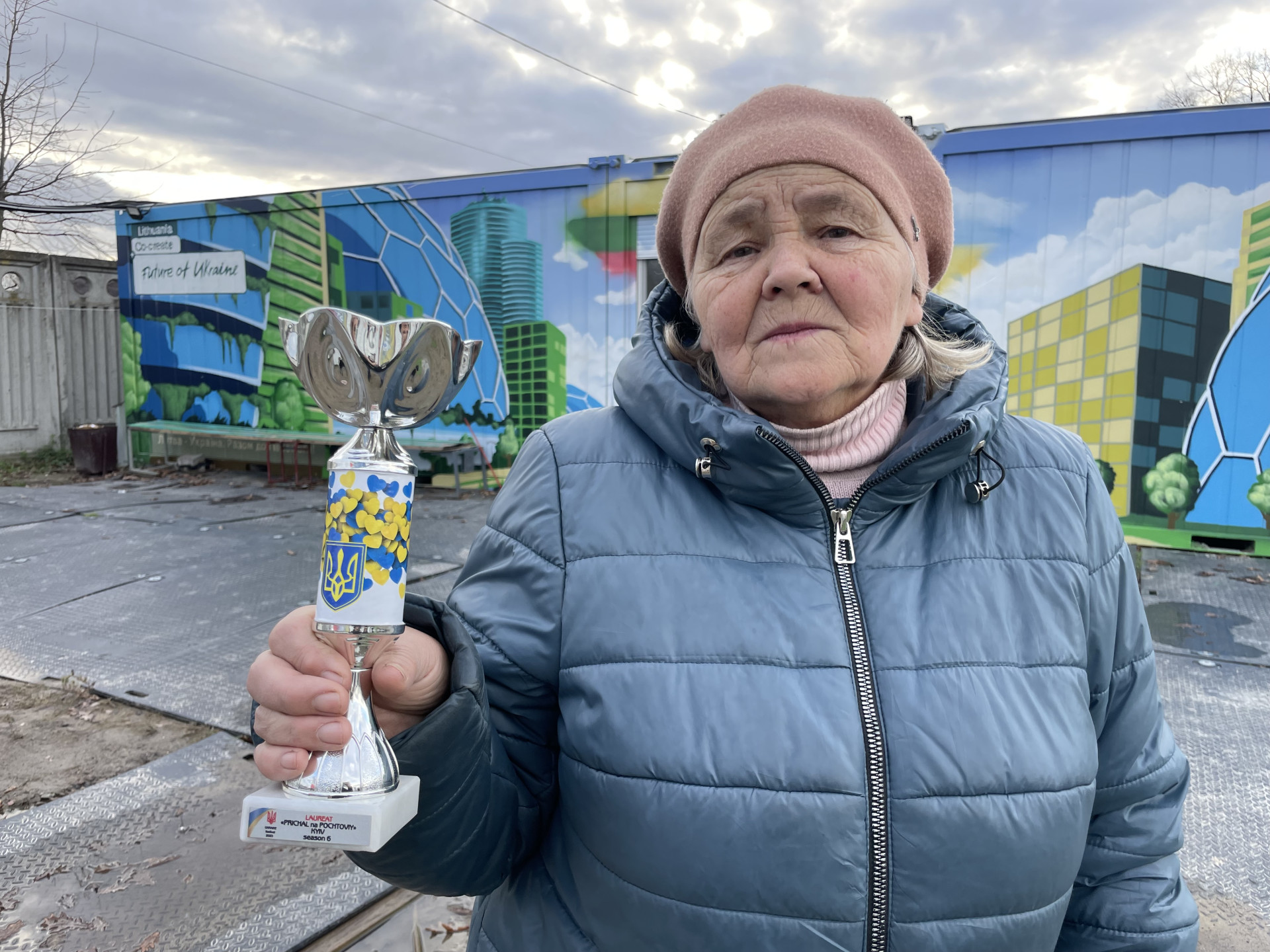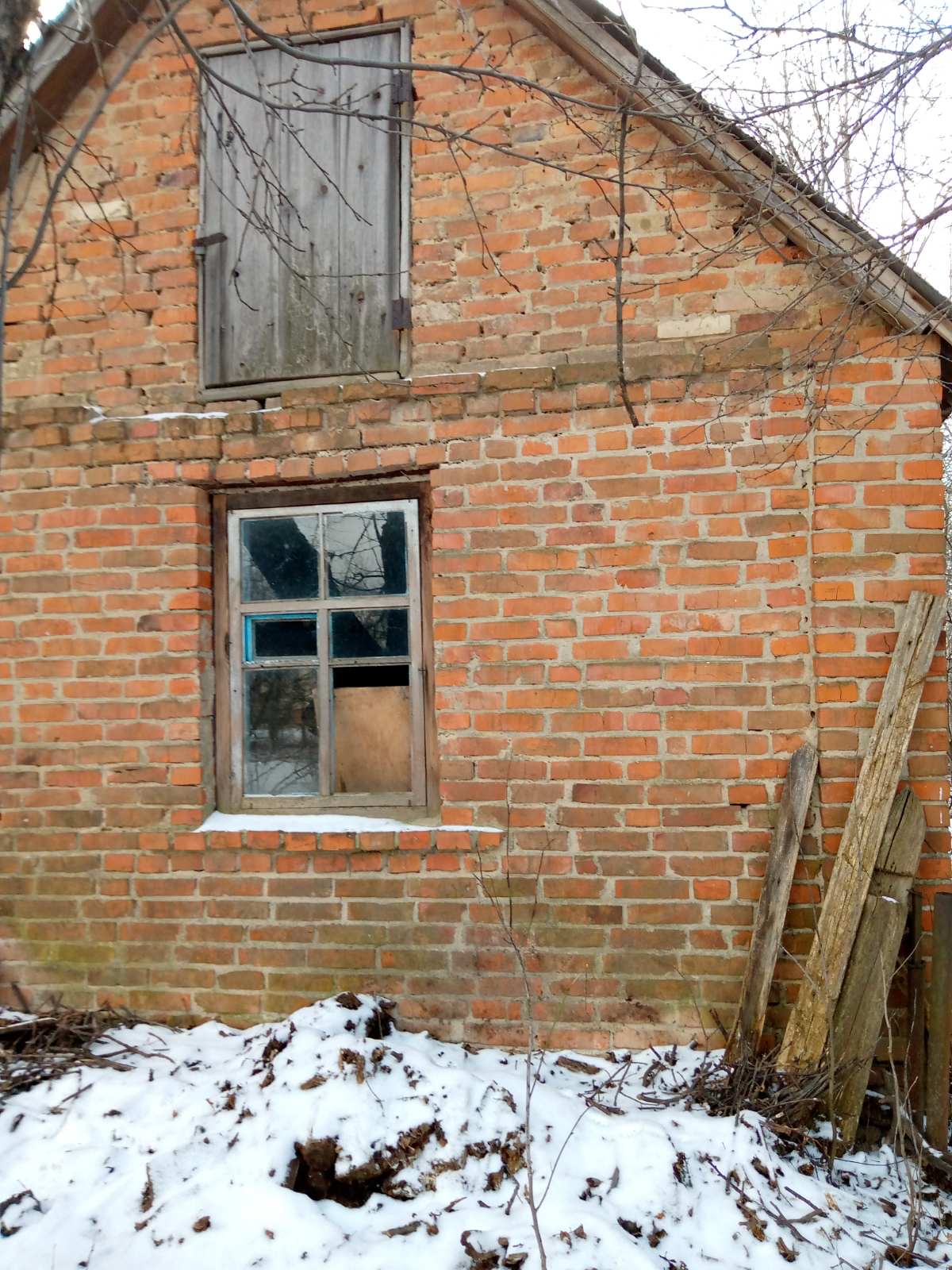Buried alive — memories of a writer from Borodianka
I am Lysenko Valentyna Mykolaivna, born in Borodianka, and I have lived here all my life. I am a writer and poetess, and I have awards.
On 1 March, we were at 6 Lisova — me, my daughter, son-in-law, two grandchildren, and my mother. She is 90 years old. I haven’t gone out since the beginning of the war because I was afraid. And my son-in-law was constantly running around, wanting to protect [people], but they told him they had no weapons. The first column reached us on the third day; it took a long time. The son-in-law ran, looked, and took photographs. And some [man] was waving to him from a tank: hide so you don’t get shot.
When they [the Russians] were driving, we immediately heard a shot from a tank and then machine gun fire on the windows. It was scary then, but we didn’t yet know what dangerous meant.
We got used to these sounds. It had become the norm. And then, on 1 March, the horror began. When the rockets flew, when the bombs flew, it was sheer horror. Everyone was sitting in the cellar, but the son-in-law was not. Everyone slept in the cellar, and he was in the house. He said if we get buried, there must be someone who would dig it up. But that night, from 1 to 2 March, we were all in the cellar. My son-in-law carried my mother in his arms; she was 90 years old and weak. She didn’t want to go into the cellar because she didn’t know how to get into it. She said I don’t care about dying anymore, and I won’t go. But then she went out of the house onto the veranda — and the door was torn out of her hands. Glass fell, and windows and doors flew out. The son-in-law carried her on his shoulders into the cellar, where we spent the night.

What did I see? A rocket was thrown into the house opposite us, near the circle. After some time, I saw how the gas exploded in half of the house and the other half. What if there was an immobile person there? What if there was a drunk or someone else there? These people would have burned alive. This is impossible to forgive. We had one cellar in the house and the second in the summer kitchen. Big, deep. I just stepped on the threshold — something flew near me. It happened twice. The Queen of Heaven probably saved me.
Then night, this terrible night. The son-in-law said: “We’re all hiding, closing ourselves, because this night will be awful.” And it was perfect that he came. He closed the cellar lid, laid the boards, and tossed pillows and rugs. We moved everything there so that the children would not catch a cold. We went to the cellar, and it began...
A plane flew above us! I want to tell you that there are many fears, but not to such a state. When an airplane is flying above you, above your head, death is flying towards you, and it is horrifying.
I prayed and asked: “Lord, protect us! Protect us, God!” And it was flying towards us again and was about to arrive. I shouted: “God, take the trouble away from us!” The baby began to cry. I was scared but switched attention to the child. “Don’t be afraid,” — we said, “We are hiding, and no one will find us here.” He was five years old then, and we told him we were playing a game so the child would not be afraid.
Something fell near us, went down, and the plane turned around and flew towards us again. It was the same again: it was flying, death was flying towards us. And again, I prayed and asked God. And the plane was above us... You know, you can go crazy from this horror. Again, the child cried — and so on three times. He circled and bombed us three times. A small alley, four houses, what did they need there? Or was it a gunner? I don’t know what it was. Thank God the bomb didn’t hit us, but it hit the house next door. There were two unexploded shells. If they exploded, everything would be blown to pieces. There lived a woman, ninety-four years old, a Russian language teacher who taught us Russian. She dedicated her life so that we could learn Russian. And these two shells killed her.
You know, these are emotions, but you can go crazy. Glory to the Lord Creator that I did not. The grandson is now just nervous, and his nose is bleeding. We are concerned about him. We try not to worry him. I once saw a child bleeding. That was awful. How much grief the Russians caused us. How much evil they have done.
What’s wrong with the house? Slates fell, windows flew out, and the door barely held on. After we came out and saw all this horror, my son-in-law said: “We’re packing up and leaving.” We left everything. The chickens were given away, but the dog remained. I’m crying for her. The dog was so faithful, but I betrayed her. We went straight to the dacha [summer house], then to Khmelnytskyi, and then to Transcarpathia. We returned somewhere around the end of May.

The house was standing, but there were cracks in the walls, and the floor had begun to collapse. The plaster was falling, and everything was leaking like crazy. The water heaters were torn, and everything perished. The stove was cracked, and there was no water. A well was in the yard, and a commission came and looked. Quicksand was somewhere; it went through the well and took the water. Everything collapsed — live as you can.
If Putin had been put in front of me and I had a machine gun, my hand would not have wavered. I would put the entire magazine into him! I can’t kill a chicken, and I can’t offend anyone. But this monster... I would have stood and remembered how they bombed us with rockets, how he gave the command to kill my friends and acquaintances. They were destroyed. They are no more like those people who were in the basement. For five days, the people in the basement screamed and howled. They were overwhelmed, and the orcs [Ukrainian name for the Russian army] did not allow us to approach.
Real orcs! They are not orcs — they are thugs! They did not allow us to approach the basement. It was impossible to get people out there. There was a need for powerful equipment to lift the slabs and rescue them.
And there they were crying, screaming, cursing. Because no one saved them, and that’s where they were buried, buried alive. Memorials need to be erected there so that people can go, pray, and ask for forgiveness for being unable to save them. That’s horrible! Just awful!
Valentyna’s poem:
I’m proud to be Ukrainian!
That I come from a wise people, from Slavs, Drevlyans, and Cossacks.
That in my veins, blood flows unceasingly,
as in those of my glorious ancestors.
I’m proud to be Ukrainian,
that our source language is my legacy.
I am the torn-off crust of bread,
and from the roots of Taras[1] I grow tall.
That I have what is most precious — I am Ukrainian.
[1] Taras Shevchenko or simply Kobzar (a bard), was a Ukrainian poet, writer, artist, public and political figure, folklorist and ethnographer. His literary heritage is regarded to be the foundation of modern Ukrainian literature and, to a large extent, the modern Ukrainian language.





